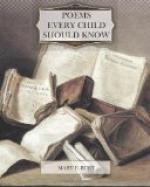This was the noblest Roman
of them all:
All the conspirators, save
only he,
Did that they did in envy
of great Caesar;
He only, in a general honest
thought
And common good to all, made
one of them.
His life was gentle; and the
elements
So mix’d in him, that
Nature might stand up,
And say to all the world,
“This was a man!”
SHAKESPEARE ("Julius Caesar").
THE SKYLARK.
Bird
of the wilderness,
Blithesome
and cumberless,
Sweet be thy matin o’er
moorland and lea!
Emblem
of happiness,
Blest
is thy dwelling-place—
Oh, to abide in the desert
with thee!
Wild
is thy lay and loud,
Far
in the downy cloud,
Love gives it energy, love
gave it birth.
Where,
on thy dewy wing,
Where
art thou journeying?
Thy lay is in heaven, thy
love is on earth.
O’er
fell and fountain sheen,
O’er
moor and mountain green,
O’er the red streamer
that heralds the day,
Over
the cloudlet dim,
Over
the rainbow’s rim,
Musical cherub, soar, singing,
away!
Then,
when the gloaming comes,
Low
in the heather blooms
Sweet will thy welcome and
bed of love be!
Emblem of happiness,
Blest
is thy dwelling-place—
Oh, to abide in the desert
with thee!
THOMAS HOGG.
THE CHOIR INVISIBLE.
“The Choir Invisible” (by George Eliot, 1819-80) is a fitting exposition in poetry of this “Shakespeare of prose.”
O, may I join the choir invisible
Of those immortal dead who live again
In minds made better by their presence; live
In pulses stirred to generosity,
In deeds of daring rectitude, in scorn
Of miserable aims that end with self,
In thoughts sublime that pierce the night like
stars,
And with their mild persistence urge men’s
minds
To vaster issues.
May I reach
That purest heaven,—be to other souls
The cup of strength in some great agony,
Enkindle generous ardour, feed pure love,
Beget the smiles that have no cruelty,
Be the sweet presence of good diffused,
And in diffusion ever more intense!
So shall I join the choir invisible,
Whose music is the gladness of the world.
GEORGE ELIOT.
THE WORLD IS TOO MUCH WITH US.
“The World Is Too Much With Us,” by Wordsworth
(1770-1850), is perhaps the greatest sonnet ever
written. It is true that “the eyes of the
soul” are blinded by a surfeit of worldly “goods.”
“I went to the Lake
District” (England), said John Burroughs,
“to see what kind of a country could produce
a Wordsworth.” Of course he found simple
houses, simple people, barren moors, heather-clad
mountains, wild flowers, calm lakes, plain, rugged
simplicity.




